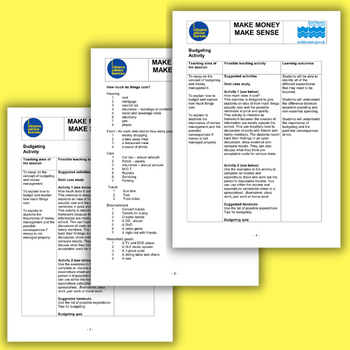Work experience – Breaking the SEND barrier

Shelly Woods recalls how staffing a new shop with local SEND students helped boost their employment skills while educating the local populace…

- by Shelly Woods

Those of us who organise work experience and work alongside learners with SEND know how much they have to offer to the workplace, and just how ambitious and exciting their dreams can be.
Throughout my career working at a special school, I got to know many young SEND learners who opened my mind to the wonderful ideas and goals they possessed. These learners barely differed at all from their peers at mainstream schools when it came to their hopes and plans. Yet, those who didn’t know them frequently perceived them as ‘too different’.
People with SEND are disproportionately passed over for employment opportunities. This is often due to a lack of work experience that would enable them to gain relevant skills. Sometimes it’s because of recruiters’ internal biases.
According to the Department for Work and Pensions, the employment gap for disabled persons reached 28.4% in 2021. This indicates that neurodivergent minds are sadly offered fewer opportunities than their neurotypical peers.
Now, we could chalk this up to simple unfamiliarity. Some employers perhaps worry they don’t have the provisions in place that they need to support an individual with SEND. But if so, what’s stopping them from being put in place?
Opening doors
Imagine instead a world in which these young learners have multiple work experience opportunities outside of school for building their confidence and developing their skills. Well, it exists.
My personal journey in special education led me to realise that we needed to open doors and minds for individuals with SEND. To that end, I embarked on opening a high street shop, The Plane Tree, in Beeston, Nottingham, with the aim of providing internship opportunities to local pupils with SEND.
As a community interest company, we’re able to support young people with SEND and adults alike with workplace training on a bespoke basis. Participating pupils work within the shop to develop their interpersonal skillsets. They gain practical work experience and develop their confidence in social situations.
A further goal of the shop is to inspire others within the wider business community to follow suit, by offering employment opportunities of their own to neurodivergent young people.
Opening the shop
The decision to open the shop was a big one. But I was confident that the outcomes would benefit the young people I’d already had the pleasure of working with across my career.
I wanted to build a business that the community genuinely valued. Not one that was simply seen as that ‘good deed’ shop.
It was also vital that the shop gain increasing exposure over time. It needed to be situated in a fully accessible, commercially advantageous area that could deliver high footfall.
Doing so has enabled the shop to occupy a highly visible, central place within in the local community. And with it, our interns have the chance to see a real, positive impact on their levels of social engagement.
We wanted the shop to actively benefit the community in some way, so we chose to stock it with artwork from 25 local artists, with hopes to continue to grow this number.
The aim was to boost their exposure and shine a spotlight on the talents of our local arts community. At the same time we were selling some lovely pieces for people’s homes.
Before the shop opened we recruited four pupils from Nethergate Academy – a local SEND school, and my former workplace, to help us set up. This gave the young people valuable space and time to adjust to the new environment. They could also practise some of their skills before we opened up to the public.
During this preparation phase, our talented interns worked tirelessly to move furniture, assist with setting up displays, learn how to work the till and complete their health and safety training. In the event, our opening day was wonderfully busy, and the pupils acquitted themselves in their new roles spectacularly.
Impacts and benefits of work experience
Since opening, our interns’ duties have expanded to include serving customers, counting stock, monitoring the shop’s pavement signage and cleaning up. We’ve also expanded the team to include another volunteer with SEND who has already finished school.
Logistically, the shop is open five days a week. The four interns work in pairs to cover shifts. Two come in on Tuesdays and Wednesdays and the others on Thursdays and Fridays. Our volunteer covers Saturdays.
On days when the pupils aren’t working at the shop they’ll be attending school or else completing their studies at home.
The shop is still only a few months old, but our interns have already been able to benefit from the experience in some clear and significant ways.
When we first opened, most were shy and anxious in social situations. We’ve since seen them blossom through their regular interactions with customers.
Giving them a chance to engage with the wider community outside of school has done a huge amount to build up their social confidence.
The shop has also given our interns a glimpse as to what the expectations and demands of working life might look like. In the process, they’ve learnt important skills around work readiness, professional behaviour and responsibility. They’re all held to a high standard and expected to clock in and out, arriving on time each day ready to begin.
The impact this has had on them is incredible. I’ve seen all of them work hard and dedicate considerable effort to up building their skills. They’re taking their roles in the shop very seriously.
High hopes
In turn, I now have high hopes that by seeing how the skillsets of our interns are developing, other employers in the local community will be encouraged and empowered to offer more opportunities of their own to individuals with SEND.
Indeed, this is starting already. We’re currently in the process of partnering with other local businesses to organise ‘mini secondments’ for the pupils. This amounts to around half an hour each week.
This will allow our young people to gain useful work experience in other professional environments. They’ll get a sense of how businesses operate in different ways, as well as helping to guide those businesses on how they can support workers with SEND.
What’s more, it’s not just our interns who have benefited from our journey thus far. Our shoppers have too! The shop has given individuals who haven’t previously spent much time around people with SEND an approachable way of bridging their gaps in understanding by taking part in meaningful interactions.
Above all, their experiences in the shop have served to showcase how pupils with SEND can very much thrive within, and add value to any community.
Key reflections
- The process of Opening The Plane Tree has given me the privilege of watching bright young minds flourish within their local community.
- It’s also presented a wonderful opportunity to boost the visibility and success of local artists. And hopefully pave the way for serious social change.
- Stigmas only serve to hold us back from achieving the kind of social harmony that can encourage all young people – neurotypical or neurodivergent – to dream big.
- We must do whatever we can to break down the barriers preventing SEND learners from realising their goals and participating in their communities. We’ve seen for ourselves the immense impact this can have.
Shelly Woods is the founder of The Plane Tree shop in Beeston, Nottingham











